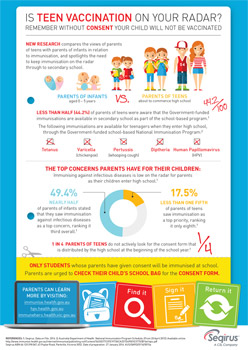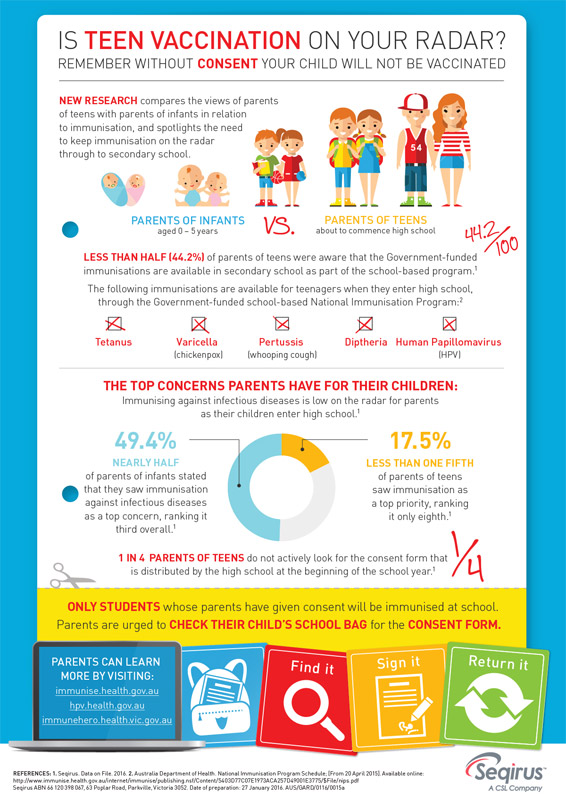Immunisation 'Low on Radar' For Parents of Aussie Teens

Immunisation -Low on Radar' For Parents of Aussie Teens
Coinciding with the new school year kick off, research among Australian parents reveals there's still a lesson to be learned when it comes to teen vaccination. Despite a comprehensive immunisation program, the majority of parents of teens (55.8%) are not aware that scheduled vaccinations are available in secondary school.
The research, which compared the views of parents of teens with parents of infants (aged 0 - 5 years) in relation to immunisation, revealed that majority of parents of infants (49.4%) considered immunisation amongst their top concerns for their child. This focus shifted dramatically among parents of teens (17.5%), with priorities turning toward education (58.4%), school/cyber bullying (48.7%), and overall emotional wellbeing and happiness (61%).
 Professor Rachel Skinner, Sydney University's Discipline of Paediatrics and Child Health and Adolescent Physician at the Children's Hospital at Westmead, says it's vital parents stay informed about vaccination regardless of their child's age and maintain a balanced focus on physical health and emotional wellbeing as they grow up.
Professor Rachel Skinner, Sydney University's Discipline of Paediatrics and Child Health and Adolescent Physician at the Children's Hospital at Westmead, says it's vital parents stay informed about vaccination regardless of their child's age and maintain a balanced focus on physical health and emotional wellbeing as they grow up.
'As our children start high school it can be natural to focus our concerns on other aspects of their wellbeing and development, and so it's not surprising that knowledge of immunisations can fall."
'It is important to keep track of your teen's immunisation status, which is still a fundamental part of protecting their health and potentially preventing the spread of infectious disease. We are urging parents to find, sign and return the vaccination consent form - without it, their child will miss out on the recommended vaccinations at school." said Professor Skinner.
Parents of teens are reliant on reminders from their school (28.6%) or local GP (19.5%)1F to help keep on top of their child's immunisations. However, more than a quarter (26.6%) stated they do not actively seek out vaccination consent forms that are distributed by their school at the start of each year,1G reinforcing the need for immunisation to remain on parents' radar long past the pre-school phase.
Recommended adolescent vaccines on the National Immunisation Program (NIP) have been delivered via school-based vaccination programs over the last two decades in Australia.2B For this often hard to reach population, the school-based vaccination program approach has demonstrated advantages over other strategies.2C Under the school-based vaccination program, the vaccines currently offered for boys and girls in high school may include chickenpox, diphtheria, tetanus, whooping cough and human papillomavirus (HPV).
Parents can visit their state health department websites or the following websites to learn more about school-based vaccination programs:
Immunise Australia - www.immunise.health.gov.au/
HPV School Vaccination Program - hpv.health.gov.au/
Immune Hero - http://immunehero.health.vic.gov.au
For more information parents should speak to a healthcare professional or visit state health department websites.
MORE



